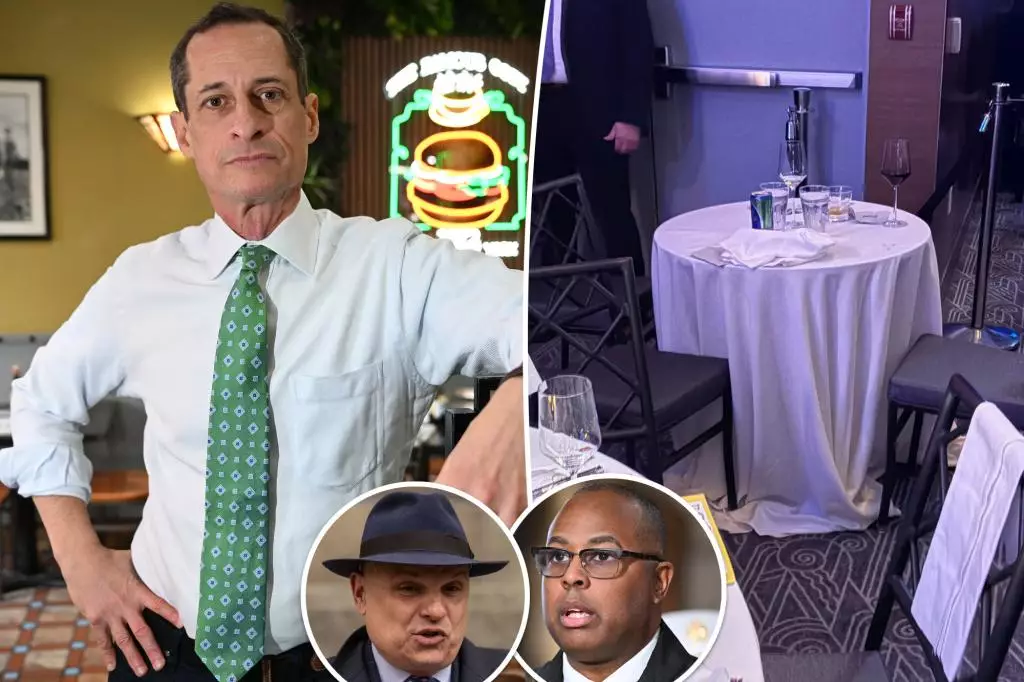In the competitive and often ruthless arena of New York City politics, the nuances of social standing can come into stark focus during networking events like the Inner Circle dinner. This storied gala—a touchstone of both media and political circles—epitomizes how involuntary dynamics play out in the world of power-hungry individuals. Recently, the case of Anthony Weiner, a once-prominent congressman turned pariah, at the 101st Inner Circle dinner has become a captivating anecdote that raises questions about status, redemption, and the often fickle nature of public perception.
At this year’s gathering, which draws politicians and the media into an evening filled with theatrical performances and roast-style comedy, Weiner reportedly found himself seated at what attendees humorously dubbed “the kids’ table.” This diminished placement at what is often referred to as the social buffet of politics highlights a reality that many face—a reminder that size not only matters in seating arrangements but also reflects the current standing of an individual on the political stage. Despite Weiner’s attempts to regain a foothold in political life, this mishap showcased the undeniable fact that he remains a figure of ridicule for many.
A Table for Three: The Unexpected Spotlight
An insider’s report described how Weiner’s transition from a larger table to a smaller, more isolated setting became a focal point of laughter among guests. Described by some as “the small Weiner table,” the episode drew attention not just to the logistics of event seating but also to the larger narrative of Weiner’s tumultuous political career and the public’s appetite for schadenfreude.
Weiner’s insistence that he left early out of personal choice rather than embarrassment further illustrates the dance between public persona and private reality. Despite his claims that he departed early to spend time with his son, the timing raised eyebrows. Was that an attempt to reclaim narrative control amidst rising whispers of table envy? It’s human to seek dignity, especially in the eye of the public, but when one is already battling a tarnished legacy, the fight for perception becomes even more profound.
Friendship and Support: A Lifeline in the Political Landscape
Arthur Aidala, Weiner’s longtime friend and defense attorney, played a significant role in this drama, highlighting how personal relationships can influence political comebacks. Aidala’s own pedigree—from a family legacy entwined with the Inner Circle event to his defense of high-profile clients—offers a glimpse into how networks can provide shelter amid the storm. His assertion that the table mishap was merely a logistical error speaks volumes about the challenges of navigating the social dimensions of political life.
Aidala openly expressed his ongoing support for Weiner, framing this mishap as a minor footnote in a long history of shared experiences. This friendship underlines a critical notion: in the world of politics, allies often become an anchor in turbulent times. Weiner’s struggle to reintegrate into a society that once glorified him adds another layer to the narrative; he is fighting against not just a personal failure but also a collective judgment that can feel overwhelming.
Cultural Resonance: The Grand Theater of Political Comedy
The Inner Circle dinner itself, a theatrical fusion of media and politics, offers a larger commentary on the spectacle of modern American politics. This annual event serves as a parody of the very institution it represents. The roasts of political figures such as Mayor Eric Adams and other prominent officials imply a certain irony—how public figures can become punchlines while simultaneously holding substantial power. It raises crucial questions about the boundary between humor and respect within politics.
As Weiner found himself at a table that metaphorically resembled the sidelines of power, an intriguing juxtaposition unfolded between jest and genuine status. The media’s portrayal of his seating situation isn’t just about Weiner; it signifies broader themes about loss, recovery, and how society chooses to remember political figures who stumble.
Through the chaos of personal upheavals and public mocks, Weiner continues to navigate a complex terrain; his participation in events like the Inner Circle is both a desperate attempt for redemption and a lesson about the permanence of reputation in the political arena. While he may vie for a comeback, experiences like his at the gala remind us of the precarious balance between social status and the relentless scrutiny of public life.
Navigating this intricate web is not only about regaining a political position but also about grappling with the ever-shifting perceptions of a society that is quick to critique yet slow to forgive.

